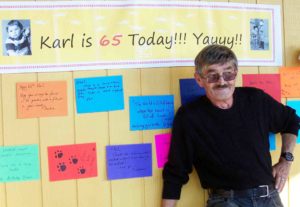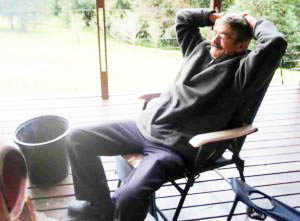I am forced to reframe Karl’s laziness
As people forgive, they realize that, once forgiven, it is good to forgive. The combination of being forgiven and then forgiving others makes possible genuine and healthy reconciliation.
⸺ Robert Enright, 8 Keys to Forgiveness, 2015: 121.
What was Karl’s laziness really about?
I often criticized Karl for being lazy, although I never him asked why he was sitting down on the job. Now, finally, in mid-February 2017, he decides to explain. I feel humbled and embarrassed as he explains that what I regarded as his laziness was merely exhaustion. Karl explains that his early life had severely damaged him. The sheer force of his will and his natural intelligence were not enough to overcome that limitation. He was also highly sensitive to anything that smacked of mistreatment or abuse. So, though he sincerely wanted a fair, equal, and balanced relationship with me, he felt that life owed him something.
A safe harbor
Life had exhausted Karl. He needed rest — and a safe harbor where he could replenish himself and consider the rest of his life.

Karl says:
I had little resilience. You could not see that, and I could not tell you. I was younger than you — I felt that I should have more to give. So, partly what you saw as laziness and my shirking my responsibilities was me trying to rest — and catch up — so that I could keep up with you!
I was nearly dead
The truth of these simple statements resonates in my heart, as Karl continues:
You could not imagine how exhausted I was! I was nearly dead. I had only my sexual energy to rely on, and I think you confused that with my general pool of energy, which was seriously depleted. My small body was pretty much worn out. The indefatigable Wadie was blind to that. I used the drugs to numb the pain and also to comfort and shelter me from my self-doubts. When I asked you to slow down, it was really for my sake. I could hardly keep up with you.

Nevertheless, Karl repeatedly reminds me that he loved our life together and wanted to keep up with me. He wanted us to be successful. But despite his desire to help, he lacked the resources:
It was like being in a car race in an old car. Like our ancient 1976 Gemimah, I needed a lot of maintenance and repair.

And then there is the delicate matter of male pride:
Being a man — and a rather proud man at that — I could not find a way to tell you this. I did not want to lose you or to be left behind. So I sat down. I did not always rise to the occasion.
Karl was, by his admission, an “exhausticated” man who loved his wife and was confused about how to manage his depleted energy.

